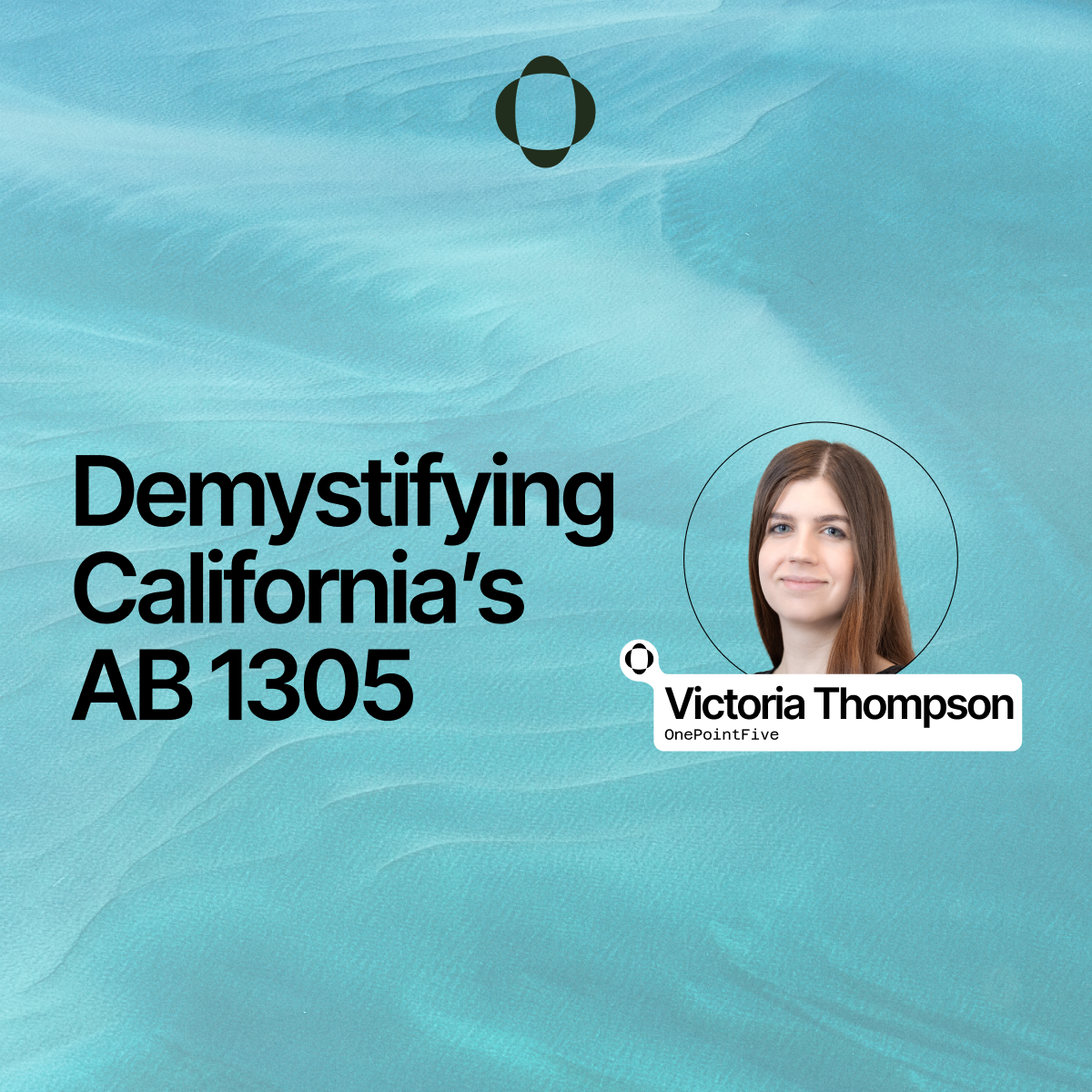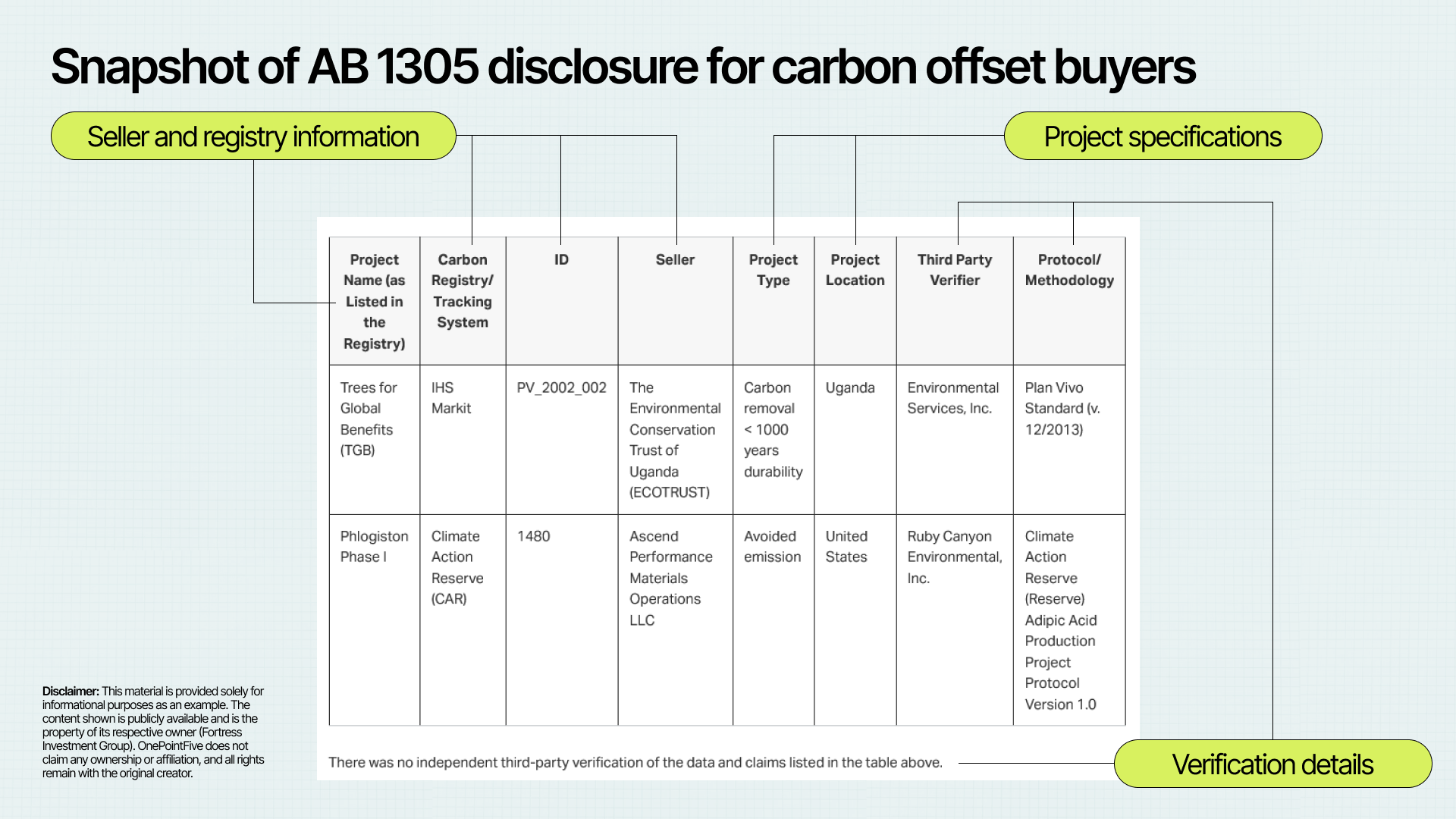Everything You Need to Know About California Assembly Bill No. 1305 (AB 1305): Voluntary Carbon Market Disclosures
By Victoria Thompson, Senior Associate at OnePointFive.
Overview of AB 1305
Scandal after scandal has emerged from the carbon offset market. Carbon offset groups have been exposed for selling sham projects, creating initiatives that actually increased emissions compared to the status quo, and counting decade-old carbon credits to offset oil & gas companies' emissions. One 2023 study found that 90% of some rainforest offset projects from a a leading carbon credit program did not have genuine carbon reductions.
California's AB 1305 emerged from growing concerns about the integrity and transparency of claims around carbon offset projects, and corporate net-zero commitments. Governor Gavin Newsom signed AB 1305 into law on October 7th, 2023 to combat deceptive green marketing practices, amid increasing regulatory pressure from the FTC (Federal Trade Commission) and growing consumer demand for transparent environmental claims.
California enacted AB 1305 as part of the California Climate Accountability Package, which also includes SB 253 and SB 261. These companion bills require large companies (with revenues over $1B and $500k, respectively) to report greenhouse gas emissions and climate-related financial risks. Overall, the package represents the most comprehensive state-level climate disclosure in the United States. As federal environmental protections are scaled back, states are increasingly taking the lead on sustainability regulation; this package marks the beginning of a trend where more states are expected to follow suit.
AB 1305 has two distinct requirements. First, companies that market, sell or buy Voluntary Carbon Offsets (VCOs) in California must disclose detailed information about their offset projects on their public websites starting January 1, 2025. In other words, if you are a company reading this, and have engaged with VCOs in California -- this law is already active and these disclosures should be up on your website! Second, the law mandates transparency from any business making net zero or carbon neutral claims while operating in California. Businesses must update their disclosures annually to stay compliant.
Companies that fail to comply face penalties of up to $2,500 per day, with a maximum fine of $500,000. Understanding the specific disclosure requirements, compliance methods, and long-term implications of this legislation, is essential for businesses making environmental claims or engaging with the carbon offset market in California.
Who does this bill apply to?
AB 1305 applies to business entities of any size, public or private, that operate in California, regardless of where they are incorporated. Foreign companies conducting business in California must comply with the same requirements as domestic entities.
Covered activities:
Marketing or selling VCOs in California
Purchasing carbon offsets while operating in the state
Making net-zero, carbon neutral, or significant emissions reduction claims
Advertising environmental benefits of products or services
Obligations for Carbon Offset Sellers and Marketers
Companies that market or sell VCOs in California must publish the following details on their website for transparency.
Required project information includes:
Protocol and methodology of emission reduction
Project location and timeline, including start date
Amount of annual reduction or removal amounts with underlying data and calculation method(s)
Project durability
Verification status, including whether an independent, 3rd party expert validated this project
Sellers must also disclose accountability measures for projects in-progress. This includes details about what will happen if the project fails to meet projected emissions reduction or removal targets.
Requirements for Carbon Offset Buyers
Disclaimer: This material is provided solely for informational purposes as an example. The content shown is publicly available and is the property of its respective owner (Fortress Investment Group). OnePointFive does not claim any ownership or affiliation, and all rights remain with the original creator.
Entities operating in California that purchase VCOs and make net zero emissions or carbon neutrality claims using those VCOs must provide specific disclosure information. This applies to companies using offsets sold in California regardless of the physical location.
Required buyer disclosure includes:
Seller and registry information
Name of offset seller, offset registry, project name, ID number
Project specifications
Site location, project type, if projects rely on carbon removal and avoided emissions
Verification details
Estimated emissions benefits
Did an independent, 3rd party expert validate this project?
Companies must make sure carbon market disclosures accurately reflect the offsets they use to support their sustainability claims.
Disclosure Details for Net Zero and Carbon Neutral Claims
Any entity operating in California or making climate claims within the state must provide appropriate documentation and verification to substantiate its environmental assertions. This requirement goes beyond carbon offset usage to encompass broader climate claims; for example, terms such as "climate positive," "climate neutral," "carbon negative," "low-carbon," "carbon-free," and "zero emissions" all fall under the scope of this legislation. This broad coverage ensures that businesses cannot simply rebrand their environmental claims to avoid disclosure requirements.
Requirements for Companies Making Environmental Claims
Evidence to support the accuracy, validity, and attainment of carbon neutral, net zero emissions, or similar claims
Details on how interim progress towards goals is measured and tracked, including science-based targets and sector methodology
Whether there is independent 3rd party verification for this data, including for underlying greenhouse gas emissions data and climate claims
Essential Details: Timeline, Documentation, and Compliance
Timeline
AB 1305 became effective January 1, 2024, with mandatory compliance beginning January 1, 2025. Companies must publish their first disclosures by this date and update information annually.
Companies should establish ongoing processes for gathering required data and updating website disclosures. The annual reporting requirement means disclosure obligations continue each year, not just for initial compliance.
Record-keeping and Documentation
Documentation systems are essential for AB 1305. Companies must maintain detailed records for all VCOs purchased, sold, or used in California.
Required documents include:
Project ID numbers
Registry information
Verification reports
Calculation methodologies
Emission reduction certifications
Records must track the lifecycle of each offset from purchase through retirement. Documentation for in-progress projects should include project timelines, durability assessments, and accountability measures. We recommend that companies create centralized data management systems to streamline tracking and make the annual disclosure update easier.
Potential Penalties for Non-Compliance
AB 1305 establishes significant financial penalties for non-compliance. Companies face fines of up to $2,500 per day for each violation, with total penalties capped at $500,000.
Common violation scenarios include:
Missing website disclosures
Incomplete project information
Unverified offset claims
Inadequate documentation
Companies should conduct regular compliance audits to identify potential gaps. External counsel (e.g., consultants, lawyers) can help assess exposure and develop remediation strategies, if needed.
Repeat violations may result in enhanced penalties and ongoing monitoring requirements. Prevention through systematic compliance programs offers the most cost-effective approach.
Future Steps
As a result of increased oversight of sustainability claims and carbon credits, we will hopefully see the VCO industry shift toward higher-quality projects with stronger documentation and transparent methodologies.
Need more assistance or personalized help?



